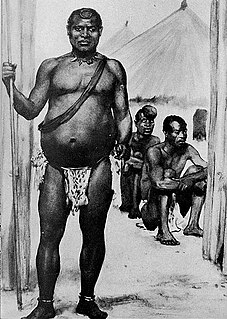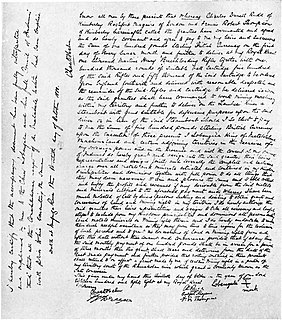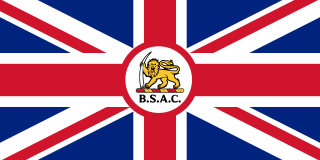The Matabele War may refer to:
- The First Matabele War (1893)
- The Second Matabele War (1896–97); also called the Matabeleland Rebellion or the First Chimurenga
The Matabele War may refer to:
Matabele may refer to:
Chimurenga is a word in the Shona language. The Ndebele equivalent, though not as widely used since the majority of Zimbabweans are Shona speaking, is Umvukela, roughly meaning "revolutionary struggle" or uprising. In specific historical terms, it also refers to the Ndebele and Shona insurrections against administration of the British South Africa Company during the late 1890s—the Second Matabele War, or First Chimurenga—and the war fought between African nationalist guerrillas and the predominantly white Rhodesian government during the 1960s and 1970s—the Rhodesian Bush War, or Second Chimurenga/Imvukela.

Lobengula Khumalo was the second king of the Northern Ndebele people. Both names in the Ndebele language mean "the men of the long shields", a reference to the Ndebele warriors' use of Nguni shield.

The Pioneer Column was a force raised by Cecil Rhodes and his British South Africa Company in 1890 and used in his efforts to annex the territory of Mashonaland, later part of Zimbabwe.
First War may refer to:
Ndebele may refer to:

Frederick Russell Burnham DSO was an American scout and world-traveling adventurer. He is known for his service to the British South Africa Company and to the British Army in colonial Africa, and for teaching woodcraft to Robert Baden-Powell in Rhodesia. He helped inspire the founding of the international Scouting Movement.
Alan, Allan, or Allen Wilson may refer to:

The First Matabele War was fought between 1893 and 1894 in modern-day Zimbabwe. It pitted the British South Africa Company against the Ndebele (Matabele) Kingdom. Lobengula, king of the Ndebele, had tried to avoid outright war with the company's pioneers because he and his advisors were mindful of the destructive power of European-produced weapons on traditional Matabele impis attacking in massed ranks. Lobengula reportedly could muster 80,000 spearmen and 20,000 riflemen, armed with Martini-Henry rifles, which were modern arms at that time. However, poor training meant that these were not used effectively.

The Second Matabele War, also known as the Matabeleland Rebellion or part of what is now known in Zimbabwe as the First Chimurenga, was fought between 1896 and 1897 in the region later known as Southern Rhodesia, now modern-day Zimbabwe. It pitted the British South Africa Company against the Matabele people, which led to conflict with the Shona people in the rest of Southern Rhodesia.

HMS Matabele was a Tribal-class destroyer of the Royal Navy that saw service in World War II, being sunk by a U-boat on 17 January 1942. She has been the only ship of the Royal Navy to bear the name Matabele, which in common with the other ships of the Tribal class, was named after an ethnic group of the British Empire. In this case, this was the Anglicisation of the Ndebele people of Zimbabwe.

The Rudd Concession, a written concession for exclusive mining rights in Matabeleland, Mashonaland and other adjoining territories in what is today Zimbabwe, was granted by King Lobengula of Matabeleland to Charles Rudd, James Rochfort Maguire and Francis Thompson, three agents acting on behalf of the South African-based politician and businessman Cecil Rhodes, on 30 October 1888. Despite Lobengula's retrospective attempts to disavow it, it proved the foundation for the royal charter granted by the United Kingdom to Rhodes's British South Africa Company in October 1889, and thereafter for the Pioneer Column's occupation of Mashonaland in 1890, which marked the beginning of white settlement, administration and development in the country that eventually became Rhodesia, named after Rhodes, in 1895.

The British South Africa Company Medal (1890–97). In 1896, Queen Victoria sanctioned the issue by the British South Africa Company of a medal to troops who had been engaged in the First Matabele War. In 1897, the award was extended to those engaged in the two campaigns of the Second Matabele War, namely Rhodesia (1896) and Mashonaland (1897). The three medals are the same except for name of the campaign for which the medal was issued, inscribed on the reverse.

Major General Sir Frederick Carrington,, was a British soldier and friend of Cecil Rhodes. He acquired fame by suppressing the 1896 Matabele rebellion.

The Sunbeam Cossack was a British 12-cylinder aero engine that was first run in 1916. The Cossack spawned a family of engines from Sunbeam.

The Shangani Patrol was a 34-soldier unit of the British South Africa Company that in 1893 was ambushed and annihilated by more than 3,000 Matabele warriors in pre-Southern Rhodesia, during the First Matabele War. Headed by Major Allan Wilson, the patrol was attacked just north of the Shangani River in Matabeleland, Rhodesia. Its dramatic last stand, sometimes called "Wilson's Last Stand", achieved a prominent place in the British public imagination and, subsequently, in Rhodesian history, similarly to events such as the Battle of the Little Bighorn and the Battle of the Alamo in the United States.

The British South Africa Company's administration of what became Rhodesia was chartered in 1889 by Queen Victoria of the United Kingdom, and began with the Pioneer Column's march north-east to Mashonaland in 1890. Empowered by its charter to acquire, govern and develop the area north of the Transvaal in southern Africa, the Company, headed by Cecil Rhodes, raised its own armed forces and carved out a huge bloc of territory through treaties, concessions and occasional military action, most prominently overcoming the Matabele army in the First and Second Matabele Wars of the 1890s. By the turn of the century, Rhodes's Company held a vast, land-locked country, bisected by the Zambezi river. It officially named this land Rhodesia in 1895, and ran it until the early 1920s.

Men of Men is a novel by Wilbur Smith, the second in the Ballantyne Novels series. It is set in the 1880s during the colonisation of Rhodesia and the First Matabele War and climaxes with the Shangani Patrol.

The Angels Weep is a 1982 novel, the third in Wilbur Smith's series about the Ballantyne family of Rhodesia. The first part of the book is set immediately before and during the Second Matabele War, then the second part jumps forward to the final days of the Rhodesian Bush War.
The Battle of Bembezi was an engagement of the First Matabele War, between the British South Africa Company and the Ndebele Kingdom.